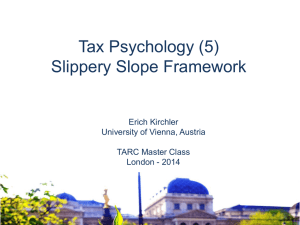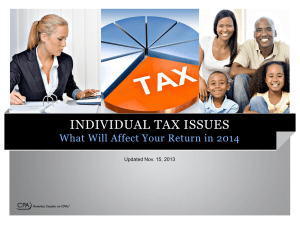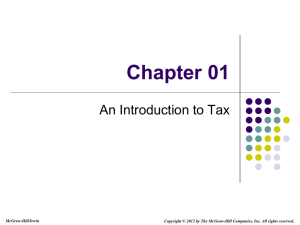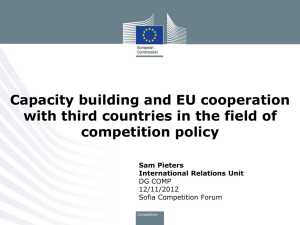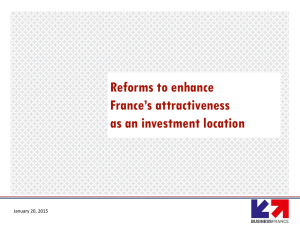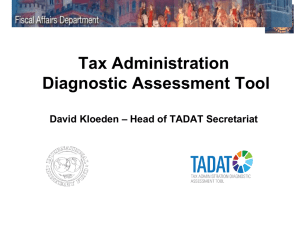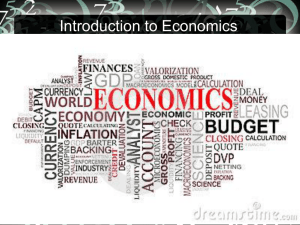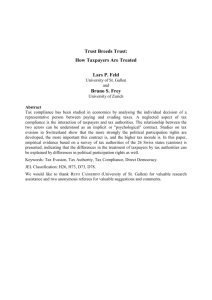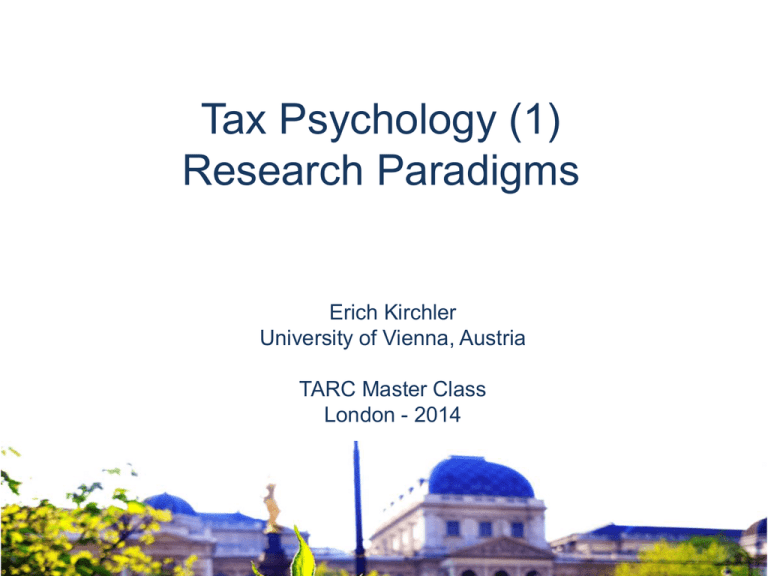
Tax Psychology (1)
Research Paradigms
Erich Kirchler
University of Vienna, Austria
TARC Master Class
London - 2014
Thanks
Team (present members)
• Barbara Hartl
• Christoph Kogler
• Eva Hofmann
• Jennifer Stark
• Katharina Gangl
• Stephan Muehlbacher
• Linda Dezsö
Team (former members)
• Barbara Kastlunger
• Boris Maciejovsky
• Erik Hoelzl
• Herbert Schwarzenberger
• Ingrid Wahl
•
Numerous Master & PhD students
Visitors
• Anca Nichita
• Larissa Batrancea
• József Pántya
International scholars
• Henk Elffers (baptized the Slippery Slope
Framework)
• James Alm
• Jane Frecknall-Hughes
• Veronika Grimm
• Claus Lamm
• Lucia Mannetti
• Luigi Mittone
• Aloys Prinz
• Michael Wenzel
• Paul Webley
• Valerie Braithwaite (host during
sabbatical year)
• Numerous researchers in 44 countries
•
study
…
2
Economic Psychology
1.
2.
3.
4.
5.
6.
7.
8.
9.
10.
11.
12.
13.
14.
Self-Conception
Objectivity & Intentions
(Psycho-) Logic
Rituals of Adults
The Invisible Hand
Mental Accounting
Trick & Treat
Courage & Risk
20 US Cents
Invulnerability
Whatever you want!
In the Shadow
Nudges
75.000 US$
Ideas of Humankind
Methods
Economic Decisions
Lay Economic Theories
Markets
Consumption, Saving, Loans
Marketing Policy
Businessmen/women
Work & Satisfaction
Financial Markets
Currency & Inflation
Counter-Productivity
State: Power and Trust
Prosperity and Happiness
3
Taxes: Giving and Receiving
Fundamental activities of the state are,
…
collecting revenues to fund public activities, and
…
using taxes, charges and levies to influence and
regulate markets as well as the behavior of citizens and
organizations
…
(progressive) taxes as an instrument to re-distribute
excessive differences in wealth
Imposts can be used as an instrument to indirectly shape human
behavior. Providing incentives and disincentives by decreasing
or increasing costs enables the state to exert control over
undesirable but legal behavior such as smoking, drinking
alcohol, and eating unhealthy foods, or to discourage
objectionable business activities (Freiberg, 2010, p. 122).
Oishi, S., Schimmack, U. & Diender, E.(2011). Progressive taxation and the subjective well-being of nations. Psychological Science, 23, 86-92.
Fig. 1. Scatter plot (with best-fitting regression line) showing mean global-life-evaluation rating as a function of progressive taxation (calculated
as the difference between the highest and lowest tax rate; N = 54 nations).
Copyright © by Association for Psychological Science
Giving and Receiving
Most citizens appreciate public goods and agree with policy
regulations,
but many perceive their own contributions too high relativ to
what they get back.
Overview
Attitudes towards taxes
Research paradigms
Decisions under risk
Social dilemma
Differential approaches
Psychological contract
Interaction climate
Practical concequences
Future research directions
Overview
Attitudes towards taxes
Research paradigms
Decisions under risk
Social dilemma
Differential approaches
Psychological contract
Interaction climate
Practical concequences
Future research directions
Germans have a tense relationship
with taxes; however, they feel it is
important to adhere to tax law
Tax mentality has deteriorated
4 factors
• 85% feel high tax pressure
• 2/3 claim, the temporal and
financial burden to file taxes is
too high
• The tax system is unjust
• 95% claim, the government
spends tax money thriftlessly
Market Institute
(Survey, 2012)
Strong desire for increasing taxes on wealth
Taxes are
too low
Work
Financial transaction tax
Black labour
Taxes are
right
Taxes are
too high
Representations of taxes
Taxes are “legal theft”,
Thomas Aquinas (1225–74)
Said in the Middle Ages.
Peter Sloterdijk (2010)
Saint Mamas, Cyprus,
protector of tax evaders
(around year 300).
Authorities‘ perception of taxpayers
First contact on internet portals … (iconography)
Home page of the Austrian Ministry of Finance
https://www.bmf.gv.at (retrieved 15-11-2013)
Home page of HMRC
http://search2.hmrc.gov.uk/kb5/hmrc/contuctus/
home.page (retrieved 10-08-2014)
Germany
http://www.bundesfinanzministerium.de/Web/DE/Home/home.html/ (retrieved
12-09-2014)
Austria
https://www.bmf.gv.at (retrieved 12-09-2014)
Home page of the Finnish Ministry of Finance
http://www.vero.fi/en-US (retrieved 15-11-2013)
Enforcing tax compliance
Traditional model from law: command and control
Traditional model from economics: rational cost-benefit analysis
Overview
Attitudes towards taxes
Research paradigms
Decisions under risk
Social dilemma
Differential approaches
Psychological contract
Interaction climate
Practical concequences
Future research directions
Actors in the field
Government
Tax authorities
Tax practitioners
Taxpayer
Taxpayer
Taxpayer
Taxpayer
Research focus and paradigms
- Type of tax: Income tax (VAT, inheritance tax, etc.)
- Actors in the field: Individual taxpayers; the “taxinteraction” context
- Tax behaviour research: Shift of attention from
authoritarian-punitive to cooperativee interaction
Research perspectives
•
Focus on the individual: paying taxes as
decision under risk (Allingham & Sandmo, 1972;
Srinivasan, 1973)
•
•
Focus on the social group: paying taxes as a
social contribution dilemma (e.g., Dawes, 1980)
Social dilemma: moral,
norms, fairness
Focus on differences between taxpayers
Differential approaches:
occupation, age,
motivation
(Braithwaite, 2003; 2009)
•
Focus on the relationship between taxpayer
and tax authority: Tax compliance as the
result of a psychological contract (Feld & Frey,
2007; 2010)
•
Decision under risk:
fines, audits
Focus on the climate: The interaction climate
of all stakeholders shapes tax compliance
(Kirchler, 2007; Kirchler, Hoelzl, & Wahl, 2008)
Psychological contract:
intrinsic motivation, tax
authority’s interaction
style
Interaction climate:
antagonistic vs
synergistic tax climate;
power, trust
Overview
Attitudes towards taxes
Research paradigms
Decisions under risk
Social dilemma
Differential approaches
Psychological contract
Interaction climate
Practical concequences
Future research directions
Decision under risk
Traditional model from law: command and control
Traditional model from economics: rational cost-benefit analysis
Deterrence
To protect honest taxpayers from free riders, controls are
necessary.
Negative sanctions are necessary at an adequate level
and in the proper form, depending on the ability of the tax
offender to pay.
Tax authorities need to cooperate intensively with
legislators, judges, and international authorities.
How to increase and guarantee tax compliance ?
Decision under risk
Sure option
Risky option
Allingham & Sandmo (1972); Srinivasan (1973)
Becker, G. S. (1968). Crime and punishment: An economic approach. Journal of Political Economy, 76, 169-217.
Average compliance rate by fine rate and audit probability
(standard deviations in parentheses; Alm et al., 1995, p. 11)
Audit
Fine rate
probability
1
2
4
----------------------------------------------------------------------------0.05
9.0 ( 4.0)
6.9 ( 3.2) 12.2 ( 4.2)
0.30
10.9 ( 6.0)
21.4 ( 4.4) 39.8 ( 7.4)
0.60
9.8 ( 8.0)
54.8 (10.6) 70.3 ( 7.5)
Why pay taxes? A review of tax compliance decisions
Erich Kirchler, Stephan Muehlbacher, Barbara Kastlunger, Ingrid Wahl (2010)
Effect on tax compliance of …
Level of
Income
Audit
probability
Tax rate
Fines
Publication
Method
Ali, Cecil, & Knoblett (2001)
Aggregate data
–
–
+
0/+**
Alm, Jackson, & McKee (1992)
Experiment
+
–
+
+
Alm, McClelland, & Schulze (1992)
Experiment
Alm, Sanchez, & de Juan (1995)
Experiment
Anderhub, Giese, Güth, Hoffmann,
& Otto (2001)
Experiment
–
Baldry (1987)
Experiment
–
Christian (1994)
Aggregate data
+
Clotfelter (1983)
Aggregate data
+
Collins & Plumlee (1991)
Experiment
Dubin, Graetz and Wilde (1990)
Aggregate data
+
–
Feinstein (1991)
Aggregate data
0
+
Fishlow & Friedman (1994)
Aggregate data
+
Friedland (1982)
Experiment
Friedland, Maital, & Rutenberg
(1978)
Experiment
Gërxhani & Schram (2006)
Experiment
Dutch sample
Albanian sample
Lang, Nöhrbaß, & Stahl (1997)
Survey*
–
Mason & Calvin (1978)
Survey*
+
Moser, Evans III, & Kim (1995)
Experiment
Park & Hyun (2003)
Experiment
0
–
+
+
Pommerehne & Weck-Hannemann
(1996)
Aggregate data
–
–
+
0
Porcano (1988)
Survey*
0
0
Schwartz & Orleans (1967)
Experiment
Slemrod (1985)
Aggregate data
–
–
Slemrod, Blumenthal, & Christian
(2001)
Experiment
Spicer & Lundstedt (1976)
Survey*
Spicer & Thomas (1982)
Experiment
+**
Trivedi, Shehata, & Lynn (2003),
Trivedi, Shehata, & Mestelman
(2004)
Experiment
+
Vogel (1974)
Survey*
–
Wärneryd & Walerud (1982)
Survey*
0
Webley, Robben, Elffers, &
Hessing (1991)
Experiment
Weck-Hannemann & Pommerehne
(1989)
Aggregate data
+
+
+
+**
0
–
+
–
0
+
+
–
+
~**
+
0
–
+
0/–**
0**
+**
0
0
0
27
0
+
–
–
+
0
Metaanalyses
Andreoni, J., Erard, B., & Feinstein, J. S. (1998).
Tax compliance. Journal of Economic
Literature, 36(2), 818-860.
Kirchler, E., Muehlbacher, S., Kastlunger, B. &
Wahl, I. (2010). Why pay taxes? A review of
tax compliance decisions. In J. Alm, J.
Martinez-Vazques & B. Torgler (eds.).
Developing Alternative Frameworks for
Explaining Tax Compliance (pp. 15-31).
London: Routledge.
Most people are honest !
Andreoni et al. (1998, p. 844)
“One possible explanation is that audits may not
turn out as badly as taxpayers initially fear. For
example, if an audit fails to uncover non-compliance
that is present or if a substantial penalty is not
applied to discovered non-compliance, a taxpayer
may conclude that it pays to cheat. Alternatively,
perhaps taxpayers do find audits to be a negative
experience, but the impact of this experience is to
make them want to evade more in the future in an
attempt to ‘get back’ at the tax agency...”
Correlations between tax evasion and measures of
psychological instigations and constraints (Elffers et al., 1987)
Behavioural outcome measures
Psychological variables
Dissatisfaction
Dissatisfaction with tax
authorities
Comprehensibility of rules
Personality
Competitiveness
Alienation
Tolerance of deviance
Fear of punishment
Social control
Personal control (attitudes)
2-year self- Documented
report
status
Documented amount of
tax evaded
0
+
+
0
+
+
+
-
0
0
0
0
0
0
Enforcing tax compliance
1. Deterrence
To protect honest taxpayers from free riders, controls are
The effect of deterrence measures
necessary.
weak and
oppostite
Negative is
sanctions
aresometimes
necessary at an
adequate level
and in thetoproper
form, depending
on the ability of the tax
the intended
effect…
offender to pay.
Tax authorities need to cooperate intensively with legislators,
judges, and international authorities.
Enforcing tax compliance
What effect have fines ?
What effect have repeated audits ?
A fine is a price !
Gneezy, U. & Rustichini, A. (2000). A fine is a price. Journal of Legal Studies 29(1) 1-18.
Experimental group: Managements of 6 day care centers introduced a fine for late pick up of children;
Control group: 4 day care centers did not introduce a fine.
Tax compliance
(Kirchler, Maciejovsky & Schwarzenberger, 2005)
.6
Compliance
.5
Audit probability 30 %
.4
.3
.2
.1
0
0
Base-line
1
2
3
4
Periods following audit
34
Robust phenomena: the “bomb crater effect“ and the „echo effect“
(Guala & Mittone, 2005; Mittone 2006; Kastlunger et al. 2009;
Maciejovsky et al. 2007)
“Echo” effect in experiments with audits in the first and second half of 60
business periods, respectively Guala and Mittone (2002, p. 12 and 13)
Tax payments (averages, first group)
Value (Italian Liras)
500
400
300
200
100
Tax due
Average tax paid
Audit
0
1
7
4
13
10
19
16
25
22
31
28
37
34
43
40
49
46
Round
55
52
58
“Echo” effect in experiments with audits in the first and second half of 60
business periods, respectively Guala and Mittone (2002, p. 12 and 13)
Tax payments (averages, first group)
Value (Italian Liras)
500
400
300
200
100
Tax due
Average tax paid
Audit
0
1
7
4
13
10
19
16
25
22
31
28
37
34
43
40
49
46
55
52
Round
58
There is more than audits and fines, …
situational and personal characteristics;
social norms, fairness, …
and perhaps the perception of taxpayers
as cheaters is short-sighted.
Change of research perspectives…
Decisions
riskrisk
Decisionsunder
under
View of humankind:
Rational (egoistic) utility maximizers;
no differences: all pursue the same goals, all respond to
tax office measures (audits, fines) similarly
Education strategies: audits and fines
Change of research perspectives…
Decisions
riskrisk
Decisionsunder
under
Authorities perceive taxpayers
as egoistic utility maximizers
and treat them accordingly
View of system:
Authorities
Taxpayers
Government
Tax authority
Taxpayers
Overview
Attitudes towards taxes
Research paradigms
Decisions under risk
Social dilemma
Differential approaches
Psychological contract
Interaction climate
Practical concequences
Future research directions
Change of research perspectives…
Social dilemma
Hessing and Elffers (1993) treat tax evasion as
defective behaviour within a social dilemma.
The social dilemma paradigm made tax of interest to
economic and social psychologists.
Overview
Attitudes towards taxes
Research paradigms
Decisions under risk
Social dilemma
Differential approaches
Psychological contract
Interaction climate
Practical concequences
Future research directions
Change of research perspectives…
Social dilemma
social dilemma with individual
interests being in conflict with collective
interests: two or more people are interdependent for obtaining outcomes; if
The tax system represents a
few people try to maximize their own outcomes, defeating is the rational choice.
However, if a large number or all people maximize their outcome the effect is that
sooner or later all get less than if they had chosen to cooperate.
optimal strategy
for rational individuals is not to cooperate. The neoclassical economic
From a mathematical and economic perspective, the
approach to tax behaviour departs from the assumption that individuals and
groups are rational agents trying to maximize their outcome by avoiding taxes.
Problem: Generalizability of findings is limited due to the fact that social dilemma
research regards contributions of members of a group rather than contributions to
an authority and exchange.
Bo Rothstein (2000)
Two conditions need to be fulfilled: taxpayers
need to trust that other taxpayers are
paying their share, and rather than filling
the pockets of tax bureaucrats tax
authorities have to ensure that the money is
invested in public welfare.
Change
of research perspectives…
Social dilemma
Social dilemma
View of humankind:
Rational utility maximizers; also social norms affect behavior.
No individual differences: all pursue the same goals; participation
(voting, voice), social norms (horizontal trust) and distributive
justice (horizontal, vertical and exchange fairness)
(In the experimental setting, authorities‘ behavior is invariant, reliable,
predictable)
Education strategies: audits and fines; fairness and social norms
Change of research perspectives…
Social dilemma
Taxpayers make assumptions
about the behavior of other
taxpayers and behave
accordingly
View of system:
Authorities
Taxpayers and social
interaction
Government
Tax authority
Taxpayers
Overview
Attitudes towards taxes
Research paradigms
Decisions under risk
Social dilemma
Differential approaches
Psychological contract
Interaction climate
Practical concequences
Future research directions
Change of research perspectives…
Differential perspective
Taxpayers should not all be lumped together and perceived
as a homogeneous group: they find themselves in various
situations, have developed different personal values, prove
generous when there are calls for donations for the socially
disadvantaged or those affected by catastrophes, and often
have a decided sense of community.
Person:
Opportunity makes the thief
Socio-demographic characteristics: age,
gender, education, income, etc.
…
Religion, personal norms, personality
characteristics, etc.
Demographic segmentation
Meta-analyses of effects of socio-demographic characteristics
(Hofmann, E. et al., 2014)
Approximately 459 studies; 570,000 participants
Age:
Studies: 416 (mainly EVS, ISSP, Latinobarometro, WVS)
N = 550,870
r = .12***
Sex:
Studies: 459 (mainly ESS, EVS, ISSP, Latinobarometro, WVS)
N = 570,408
r = .06***
Education: Studies: 342 (mainly EVS, ISSP, Latinobarometro, WVS)
N = 439,099
r = -.02***
Income: Studies: 340 (mainly EVS, ISSP, WVS)
N = 390,902
r = -.04***
Motivational postures
Braithwaite & Ahmed: tax moral =“internalized obligation to
pay tax”.
Frey (1997) and Alm & Torgler (2005) define tax morale as
“intrinsic motivation to pay one’s taxes”.
Orviska & Hudson (2002) link morale to the concept of civic
duty. Civic duty proposes that people are motivated by a
sense of responsibility and loyalty to the society and nation.
Their behaviour is not regulated externally by audits and
sanctions but by their concern for the society.
Motivational postures and statements representing them (Braithwaite, 2003a, p. 20)
Motivational
posture
Description
Commitment
Commitment combines a positive orientation towards
tax authorities and deference. The tax system is
perceived as desirable, tax law and tax collection are
perceived as fair. Committed taxpayers feel a moral
obligation to pay their share and to act in the interest of
the collective.
Capitulation
Capitulation reflects a positive orientation in terms of
acceptance of the tax authorities which hold legitimate
power to pursue the collective’s goals. As long as
citizens’ act according to the law, authorities are
perceived to act in a supportive way.
d)
Resistance reflects a negative orientation and
defiance. The authority of tax officers may be doubted
and their acts be perceived as controlling and
dominating rather than as supportive.
g)
Resistance
Statements representing motivational
postures
a)
b)
c)
Deference
e)
f)
h)
i)
Disengagement
Also, disengagement reflects a negative orientation
and correlates with resistance. Individuals and groups
keep socially distant and blocked from view and have
moved beyond seeing any point in challenging tax
authorities.
j)
Game playing expresses a view of law as something
that can be moulded to suit one’s purposes rather than
as a set of regulations that should be respected as
guideline of one’s actions. In the field of tax behaviour,
game playing refers to “cop-and-robber” games with
taxpayers detecting loopholes for their advantages and
perceiving tax officers as cops which engage in
catching cunning taxpayers.
m)
k)
l)
Deterrence
Game playing
n)
o)
Paying tax is the right thing to do.
I feel a moral obligation to pay my tax.
Overall, I pay my tax with good will.
If you cooperate with the Tax Office, they are likely
to be cooperative with you.
The tax system may not be perfect, but it works
well enough for most of us.
No matter how cooperative or uncooperative the
Tax Office is, the best policy is to always be
cooperative with them.
If you don’t cooperate with the Tax Office, they will
get tough with you.
It’s important not to let the Tax Office push you
around.
It’s impossible to satisfy the Tax Office completely.
If I find out that I am not doing what the Tax Office
wants, I’m not going to lose any sleep over it.
I don’t care if I am not doing the right thing by the
Tax Office.
If the Tax Office get thought with me, I will become
uncooperative with them.
I enjoy spending time working out how changes in
the tax system will affect me.
I enjoy talking to friends about loopholes in the tax
system.
I like the game of finding the grey area of tax law.
53
Australian Taxation Office Compliance Model and Motivational Postures
(adapted from Braithwaite, 2003b, p. 3, James et al., 2003)
Prosecution
Disengagement
Command regulation (nondiscretionary; use full
force of the law)
Resistance
Audit with/
without penalty
Command regulation
(discretionary; deter by detection)
Capitulation
Real time business
examinations,
record keeping reviews
Commitment
MOTIVATIONAL
POSTURE
Enforced self-regulation
(help to comply)
Self-regulation (make
compliance easy)
Education, record keeping,
Service delivery (convenience,
access, choice, control
ENFORCEMENT STRATEGIES
REGULATORY
STRATEGIES
Change of research perspectives…
Differential perspective
View of humankind:
Social beings with different motivational postures
Education strategies: responsive regulation
Change of research perspectives…
Differential perspective
Segmentation and
responsive regulation
View of system:
Authorities
Individuals
characterized by
motivational postures
Government
Tax authority
Taxpayers
Diffusion of income tax evasion
10-15% of underreported income
Porcano (1988), the U.S. IRS estimated 10-15% of underreported income in 1983. Five years later the tax gap was about 17% of true liability.
25% underpaid
7.3% non-compliance, wide variation across types of income and deductions
Slemrod et al. (2001) explain that the detected rate of non-compliance is 7.3%, but varies widely across types of gross income and deductions. In 1988, voluntary
Andreoni and colleagues (1998) estimate that over 25% of all U.S. taxpayers underpaid their taxes in 1988. In developed countries, tax evasion is estimated to
reach 20% of the level of tax revenues, while in developing countries the percentages are even higher (Orviska & Hudson, 2002).
reporting was 99.5% for wages and salaries, but only 41.4% for self-employed income. In 2002, King & Sheffrin report that according to the U.S. IRS, 99% of
wage income is correctly reported, but less than 70% of income from unincorporated businesses is correctly reported.
Elffers (2000) writes, “[…] the
gloomy picture of massive tax
4.2% corrected their tax files to their disadvantage, 23.8% corrected them to their
advantage.
Assuming that
those
negatively
correcting their files made unintentional
evasion
is
a
phantom”.
make
reports. 13.5%
overstate
their taxes,
presumably
duedid
to
mistakes,¼and
an accurate
equal percentage
of those
who positively
corrected
their files
voluntary reporting 99.5% for wages and salaries, but only 41.4% for self-employed
There is little doubt that non-compliance should be contained and evasion, in particular, needs to be combated. It is, however, wrong to assume that the majority
of people try to evade or avoid paying taxes.
Long and Swingen (1991) write that some taxpayers are not predisposed to evade and do not search for ways to cheat. Survey studies and experiments on
income tax behaviour show that honesty characterises a majority of participants (e.g., V. Braithwaite, 2003d; James & Alley, 2002; Kirchler, Muehlbacher, Hoelzl,
& Webley, 2005).
Antonides and Robben found that 4.2% of participants in their study corrected their tax files to their disadvantage, whereas 23.8% corrected them to their
advantage (Antonides & Robben, 1995). Assuming that those negatively correcting their files made unintentional mistakes, and an equal percentage of those who
positively corrected their files did so also undeliberately, then less than 20% were intending to cheat.
On the basis of 1982 U.S. IRS audit data, Alexander and Feinstein (1987) report that approximately one quarter of all taxpayers make accurate tax reports.
According to their analysis, 13.5% overstate their taxes, presumably due to errors in completing tax returns. If the same percentage understates their taxes due to
errors, then more than half of taxpayers tend to be honest.
errors. If the same
understates
taxes due to errors, then
so also undeliberately,
then percentage
less than 20%
intend to their
cheat.
more than half of taxpayers tend to be honest.
Hessing, Elffers, and Weigel (1988) estimate that more than two thirds of taxpayers declare their income honestly.
2/3 declare their income honestly
The assumption that taxpayers are generally compliant is challenged by the wide use of tax preparers and studies contending that taxpayers generally demand
aggressive advice (Duncan, LaRue, & Reckers, 1989; Jackson, Milliron, & Toy, 1988; Milliron, 1988). These studies were conducted from tax preparers’ view, but
investigations from taxpayers’ perspectives reveal a different picture. The use of a tax practitioner does not seem primarily driven by the desire to avoid paying
taxes, but by the uncertainty about the tax law and the motivation to report correctly.
The use of a tax practitioner does not seem primarily driven by the desire to avoid
paying taxes, but by the uncertainty about the tax law and the motivation to report
correctly.
Overview
Attitudes towards taxes
Research paradigms
Decisions under risk
Social dilemma
Differential approaches
Psychological contract
Interaction climate
Practical concequences
Future research directions
Legal vs illegal tax behavior
• Tax evasion
• Tax avoidance
Profit shifting and aggressive tax
planning
Amazon
Apple
Tax law isGoogle
not always clear…
Starbucks
Slemrod et al.etc.
(2001, p. 459): “… although one can assert that legality is
the dividing line between evasion and avoidance, in practice the line is
Sullivan (2012, quoted by Fuest, Spengel,
blurry...”
Finke, Hecknmeyer & Nusser, 2013) … tax
avoidance
strategies
by for
exploitation
of negotiations
Complexity and
unclear law
opens space
interpretations,
etc.
loopholes in existing tax laws and profit
The concern shifting
of legality…
grew
with
business
globalisation,
lead
togrowing
effective
tax rates
… on
increasing complexity of business structures, the nature of financing and
foreign profits by Apple and Google of 1%
transactions, and tax flight by establishing businesses off shore, tax
3%,
respectively,
thus
approaching
heavens, andand
money
laundering
(Owens
& Hamilton,
2004). Modern
0%.
organised noncompliant
business acts within the law, exploiting the law’s
shortcomings and loopholes.
60
Profit shifting and aggressive tax
planning
To effectively combat aggressive tax avoidance and to increase tax justice, Hey,
Schreiber, Pönnighaus and Bierbrauer (2013) underline the need for an international
consensus how to jointly regulate taxpaying behavior of people and businesses. It is
necessary to respond to multinational corporations’ activities by developing rules and
instruments to effectively control and influence their behavior to enforce compliance.
It is necessary to establish a sense of
wrong-doing in the society, reflected judgment of
unfairness of tax avoidance and evasion, and to effectively regulate taxpaying behavior.
How shall a sense of wrong-doing be established in the society?
It is necessary to invest in a climate of cooperation basing on power of authorities and
trust in authorities.
Change of research perspectives…
Psychological contract
Taxpayers are not necessarily unwilling to contribute to the
commons; most experience a psychological
contract of reciprocity between the
authorities and themselves and are intrinsically
motivated to cooperate if the distribution of burden and
benefits and the procedures are perceive fair.
Fairness
Frans de Waal



